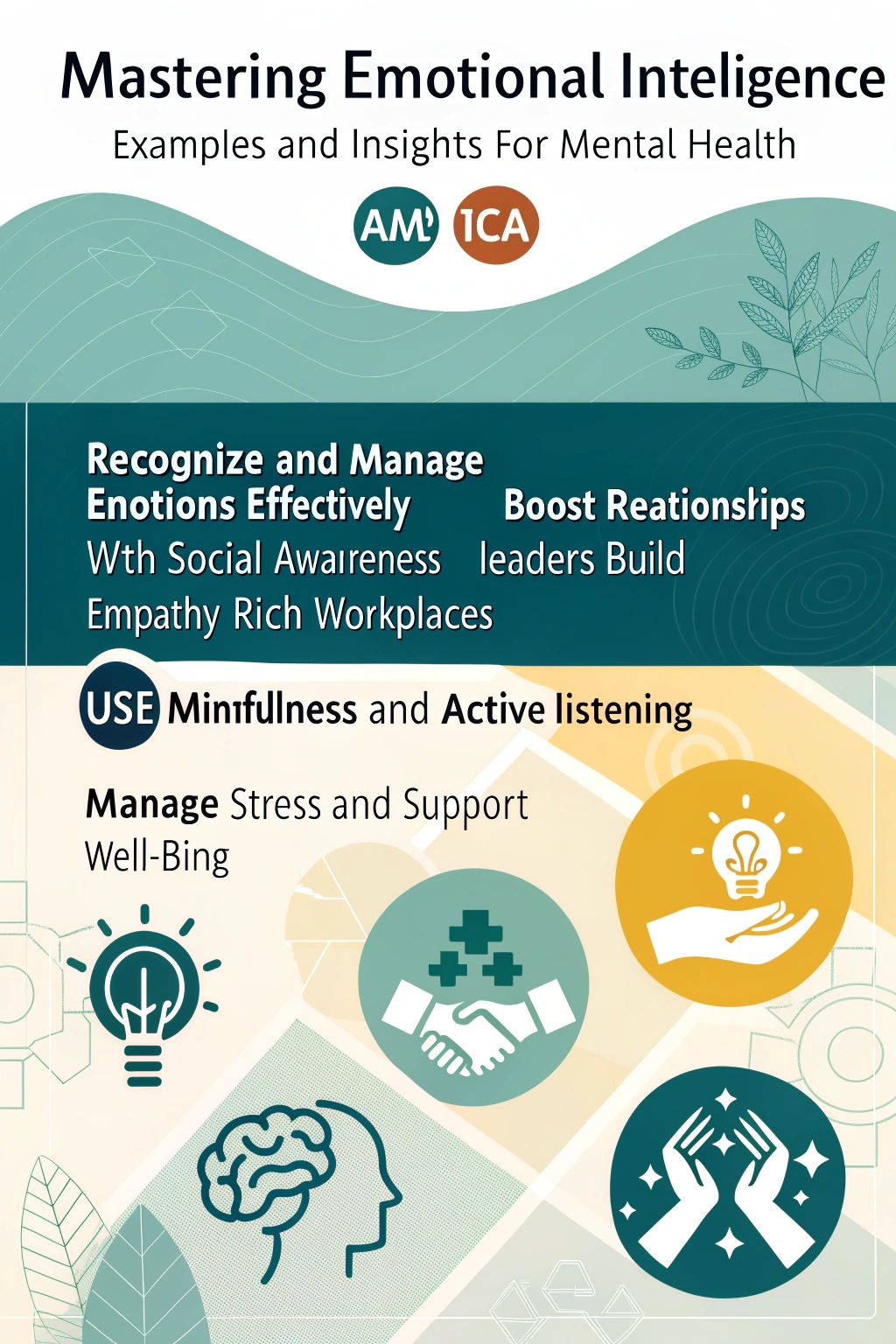Many people find it hard to understand and manage their feelings. This can make life at work, school, or home tough. Emotional intelligence with examples shows us how to get better at this.
One key fact is that emotional intelligence helps us see our own emotions and those of others. This lets us make good choices and connect well with people.
Our blog will guide you on using emotional intelligence every day. You will learn about its parts like self-awareness and empathy. We will also show you ways to grow your skills in understanding feelings.
Keep reading to learn more about it!

Understanding Emotional Intelligence

Understanding Emotional Intelligence is essential for personal and professional development, as it involves the capability to recognise and effectively manage one’s own emotions. It also encompasses the capacity to comprehend others’ feelings, resulting in more positive relationships and enhanced interpersonal skills.
Definition and Importance
Emotional intelligence (EI) is the skill to recognise, understand, and handle one’s own emotions while also dealing with the emotions of others. Salovey & Mayer introduced this concept in 1990, and Daniel Goleman expanded it in 1996.
EI plays a critical role in determining success, more so than IQ. Research by Koubova and Buchko in 2013 found that EI predicts better outcomes for personal relationships, life satisfaction, and career achievements.
High levels of EI contribute to innovation and superior performance at school or work as shown by MacCann et al., in 2020; Krén and Séllei also supported these findings in 2021. Leaders who display high emotional intelligence can foster employee loyalty and increase productivity within their teams, according to research by Miao, Humphrey, and Qian from 2017.
This evidence highlights the immense value of developing strong emotional skills not just for personal growth but also for enhancing professional environments.
Core Components: Self-Awareness, Self-Management, Social Awareness, Relationship Management
Self-awareness is knowing one’s own feelings and how they affect thoughts and behaviour. It involves understanding personal strengths and weaknesses. People use this knowledge to handle stress better and adapt to changes in life.
For example, recognising when you’re stressed helps manage your emotions more effectively. Self-aware people can pinpoint what they need to improve.
Self-management follows self-awareness closely. It means controlling one’s impulses and managing emotions in healthy ways. This skill lets individuals set goals and work towards them without giving up easily.
Social awareness allows someone to understand others’ feelings, needs, and concerns by being empathetic; leaders with high social skills often build trust quickly within their teams by acknowledging team members’ feelings.
Relationship management involves using emotional awareness to nurture positive relationships; this includes good communication skills, teamwork, and handling conflicts wisely.
Emotional Intelligence in Everyday Life
Improving Personal Relationships and Enhancing Workplace Dynamics are pivotal elements of Emotional Intelligence in everyday life. Effective communication, empathy, and conflict resolution skills are vital in nurturing healthy relationships both personally and professionally.
Enhancing Personal Relationships
Emotional intelligence carries significant weight in amplifying interpersonal relationships. Increased emotional intelligence assists individuals in discerning and regulating their personal feelings, and efficiently recognising and reacting to the sentiments of others.
This ability is indispensable for cultivating sturdy, wholesome relationships. It promotes understanding and active listening, simplifying the process of associating intimately with friends, family, and partners.
Applying active listening constitutes a method to augment emotional intelligence within relationships. It demands accurate understanding of the speaker’s words and expressing authentic interest in their statements without precipitously drawing assumptions or dispensing advice.
This method not merely consolidates connections but also erects trust and esteem among individuals. People experience a sense of appreciation when they realise their words are being attentively considered, which sequentially can culminate in more substantive exchanges and robust bonds.
Improving Workplace Dynamics
Leaders with high emotional intelligence (EI) play a key role in enhancing workplace dynamics. They make better decisions and create a healthy work environment, as research by Madrid, Niven, & Vasquez in 2019 shows.
These leaders know how to manage their own feelings and understand those of their team members. This skill helps them boost morale and encourage teamwork.
Open communication about feelings among colleagues also improves the atmosphere at work. It builds resilience and adaptability to change. For example, when team members feel comfortable sharing their thoughts without fear of judgement, they work together more effectively.
Leaders can foster this kind of open environment by practising empathy and providing constructive feedback. This approach not only lifts employee spirits but also promotes professional growth within the organisation.
Practical Examples of Emotional Intelligence
In leadership, individuals with high emotional intelligence are adept at making decisions while considering the impact on others and demonstrating empathy. In education, those with high emotional intelligence excel in conflict resolution and promoting cooperation among peers.
In Leadership: Decision Making and Empathy
Leaders possessing high emotional intelligence (EI) have the ability to inspire their team. They cultivate trust and enhance the work environment. This was confirmed in 2020 by Kennedy, Campis, and Leclerc.
These kind of leaders pay heed to their people and respond with empathy, thus making everyone feel appreciated.
Effective leaders also exhibit astute decision-making skills by being conscious of their own emotions and those of others around them. George’s 2000 study showed that leaders, in a positive mood, make more favourable decisions for the organisation.
For example, clear articulation of objectives is imperative. Disney instructs its staff to “Make People Happy,” a notion that is simplistic yet impactful. Such strategies underscore how effective leadership is not only about dictating orders—it’s about human connection and guiding with empathy.
In Education: Conflict Resolution and Cooperation
Teachers use “take a break” corners in classrooms. This helps young pupils manage their feelings. They learn to calm down before they talk about problems. Emotional intelligence teaches them this skill.
Schools also have writing exercises for solving disputes. These tasks let children express and work through disagreements effectively.
Another method involves empathy-building activities, like peer interviews and charity projects. These make students better at understanding each other’s emotions. When kids learn to see things from another’s point of view, they cooperate more.
They solve conflicts without fights or anger.
Enhancing Emotional Intelligence with Your Partner
Working on emotional intelligence with your partner can bring peace and make both of you happier. You start by sharing optimistic views and getting excited about things together. This builds a strong base for cooperation and better communication.
Showing understanding for each other’s emotions makes managing impulses easier.
Practising active listening is another way to boost emotional intelligence in relationships. When one person talks, the other listens closely without interrupting or judging. This shows respect and helps both understand each other’s feelings better.
Making these efforts improves the way you manage emotions together, leading to a more fulfilling relationship.
Enhancing Emotional Intelligence
Improving Emotional Awareness and Communication Skills enhances emotional intelligence. Developing the ability to empathise and actively listen contributes to strengthening emotional intelligence in various aspects of life.
Developing Emotional Awareness
Building emotional awareness is vital for nurturing healthy relationships and enhancing personal well-being. One effective strategy involves embracing mindfulness, enabling individuals to connect with their emotions in a non-judgmental manner.
This can be supplemented by identifying emotions as they arise, fostering a deeper understanding of one’s internal experiences. Through regular practice of these techniques, individuals can gain greater insight into their emotional states and learn to manage them effectively.
These methods empower individuals to cultivate a heightened sense of self-awareness, enabling them to recognise and navigate their emotions with ease. Moreover, this emotional intelligence skill forms the basis for developing stronger interpersonal connections and promoting positive mental health outcomes, ultimately contributing to a fulfilling and enriching life experience.
Practising Active Listening and Assertive Communication
Practising active listening involves fully concentrating, comprehending, responding, and recalling what the person you’re talking to is saying. It’s crucial to validate someone else’s feelings and emotions effectively in order to improve emotional intelligence.
By being self-aware and able to recognise others’ feelings, individuals can develop their ability to control and regulate emotions better, thereby creating opportunities for increased empathy and improved relationships.
Positive communication means expressing your thoughts, feelings, needs, and desires honestly while respecting the rights of others. This is a critical skill for leadership development as it enables individuals to take the initiative in addressing conflicts or concerns assertively yet diplomatically.
Furthermore, incorporating active listening with positive communication can foster human-centred leadership qualities that are essential for maintaining employee morale and productivity within workplace dynamics.
Emotional Intelligence for Mental Health
To elevate mental well-being, cultivating emotional awareness and practising active listening are vital. Handling stress and acknowledging others’ emotional states helps nurture a supportive environment for improved mental health.
Managing Stress and Anxiety
High emotional intelligence (EI) is crucial in handling stress and anxiety. People with high EI have the ability to perceive and control their own emotions, which helps them effectively deal with challenging situations.
This self-management not only decreases stress but also boosts mental health. Furthermore, individuals with high EI can empathetically understand others’ emotions, creating supportive environments and aiding in reducing anxiety levels.
Practising active listening and assertive communication are crucial for boosting emotional intelligence to manage stress and anxiety. These skills help individuals understand their emotions and others’, leading to improved relationships and reduced miscommunication, which often leads to increased stress levels.
Moreover, developing emotional awareness helps individuals identify stress or anxiety triggers, enabling proactive steps to mitigate these negative emotional states. Such practices certainly contribute significantly towards fostering resilience against stressors while promoting positive mental health outcomes.
Recognising and Responding to Others’ Emotional States
Recognising and responding to others’ emotional states is an essential aspect of emotional intelligence. It involves the ability to empathise with people, understand their feelings, and effectively communicate support or assistance.
Social awareness, as a key component of emotional intelligence, encompasses this skill set. For instance, when someone appears stressed or upset at work, being able to recognise these emotions allows for appropriate interaction and support within workplace dynamics.
Recent research has highlighted the importance of recognising others’ emotional states in various contexts such as mental health settings and educational environments. Studies indicate that individuals who excel in social awareness demonstrate an increased capacity for understanding different perspectives and communicating empathetically; thus fostering healthier interpersonal relationships.
Conclusion
Mastering emotional intelligence is essential for personal and professional growth. Understanding emotions, managing them effectively, and empathising with others can lead to better relationships, improved decision-making, and a healthier mental state.
By practising self-awareness, active listening, and assertive communication, individuals can enhance their emotional intelligence in everyday life. This not only benefits their well-being but also contributes to a harmonious workplace environment.
MindOwl Founder – My own struggles in life have led me to this path of understanding the human condition. I graduated with a bachelor’s degree in philosophy before completing a master’s degree in psychology at Regent’s University London. I then completed a postgraduate diploma in philosophical counselling before being trained in ACT (Acceptance and commitment therapy).
I’ve spent the last eight years studying the encounter of meditative practices with modern psychology.

